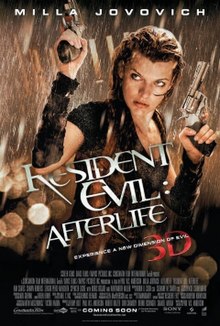| Resident Evil: Afterlife | |
|---|---|
 Theatrical release poster | |
| Directed by | Paul W. S. Anderson |
| Written by | Paul W. S. Anderson |
| Based on | Resident Evil by Capcom |
| Produced by |
|
| Starring | |
| Cinematography | Glen MacPherson |
| Edited by | Niven Howie |
| Music by | Tomandandy |
Production companies |
|
| Distributed by | Sony Pictures Releasing (Worldwide; under Screen Gems)[1] Constantin Film Verleih (Germany)[2] Metropolitan Filmexport (France)[2] |
Release dates | |
Running time | 97 minutes[5] |
| Countries | |
| Language | English |
| Budget | $60 million[2] |
| Box office | $300.2 million[2] |
Resident Evil: Afterlife is a 2010 action horror film[2] written and directed by Paul W. S. Anderson. It is the second film in the series that he directed, after the first film. A direct sequel to Resident Evil: Extinction (2007), it is the fourth installment in the Resident Evil film series, which is loosely based on the video game series of the same name, and the first to be shot in 3D. It stars Milla Jovovich, Ali Larter, Kim Coates, Shawn Roberts, Spencer Locke, Boris Kodjoe, and Wentworth Miller.
The film follows Alice searching for and rescuing the remaining survivors in Los Angeles after the T-virus outbreak, and teaming up against Albert Wesker, the head of the Umbrella Corporation. Chris Redfield, a primary character from the video games, was featured for the first time in the film franchise. Other characters from the games and films who returned are: Claire Redfield, Chris's sister who has lost her memory prior to the film's events; Albert Wesker, the film's main antagonist; and Jill Valentine, who made a cameo appearance.
In May 2005, producers mentioned the possibility of following Extinction with a sequel titled Afterlife. Extinction was released in 2007 and was a box office success, prompting Afterlife to begin development in June 2008, with the script being written by Anderson that December. Elements from the video game Resident Evil 5 (2009) were incorporated into the film including the mind control devices and Chris' confrontation with Wesker. Filming took place in Toronto from September to December 2009 using the 3D Fusion Camera System.
The film was released on September 10, 2010, to generally negative reviews. The film grossed $60 million in the United States and Canada on an estimated $60 million budget, and made $240 million in other markets surpassing the previous film's overseas total in the second week of release. Grossing a worldwide total of $300 million, Resident Evil: Afterlife became the second highest-grossing entry of the series. Resident Evil: Afterlife was released to DVD, Blu-ray, and Blu-ray 3D on December 28, 2010, in the United States. A fifth film, Resident Evil: Retribution, was released in 2012.
- ^ a b c d "Resident Evil: Afterlife". AFI Catalog of Feature Films. Retrieved December 6, 2018.
- ^ a b c d e Cite error: The named reference
BoxOfficeMojowas invoked but never defined (see the help page). - ^ ""Resident Evil: Afterlife" premiere in Tokyo - Photos". UPI.
- ^ "RESIDENT EVIL: AFTERLIFE 3D Worldwide Premiere From Tokyo, Japan". msnbc.com. August 30, 2010.
- ^ Cite error: The named reference
BBFCwas invoked but never defined (see the help page). - ^ a b c d "Resident Evil: Afterlife (2010)". BFI. Archived from the original on August 29, 2019.